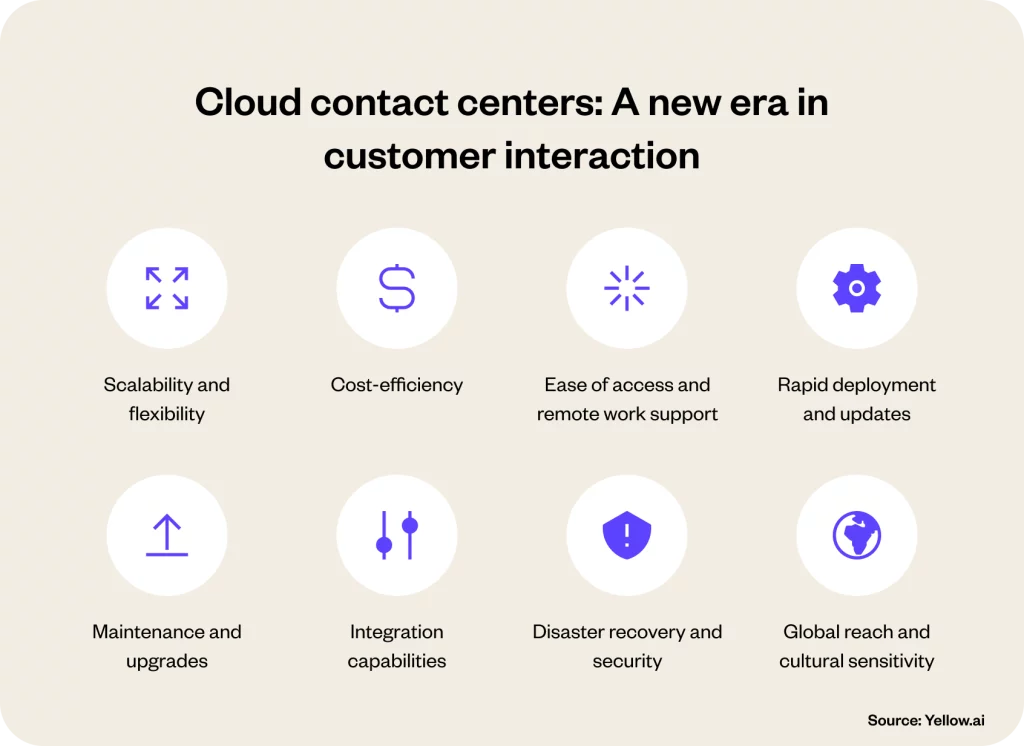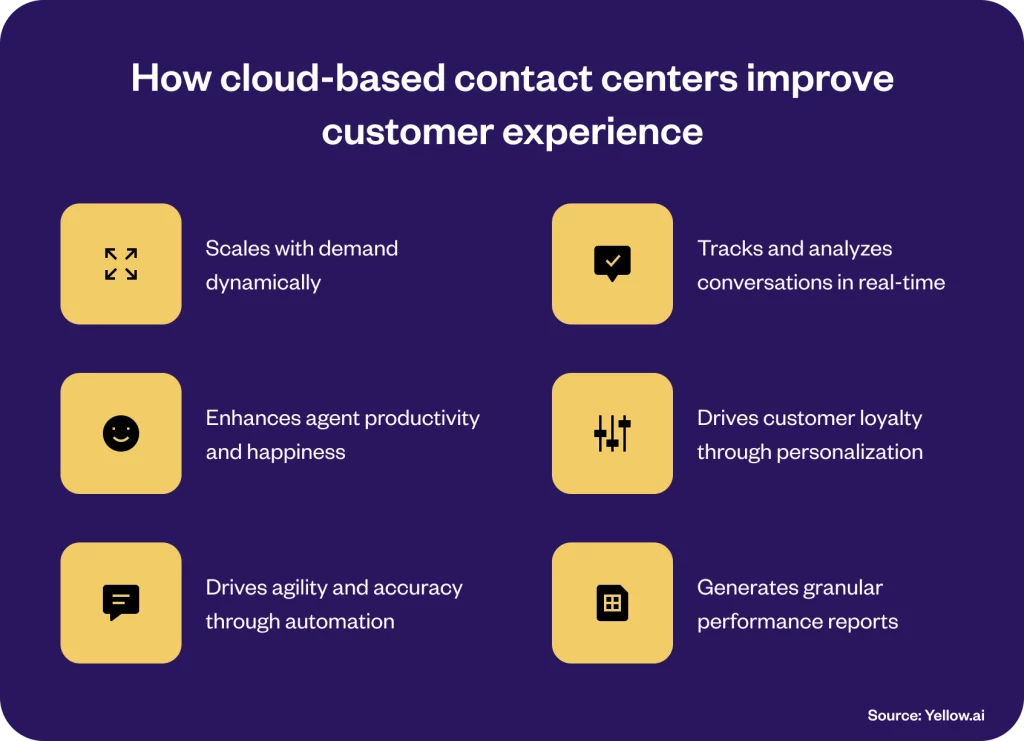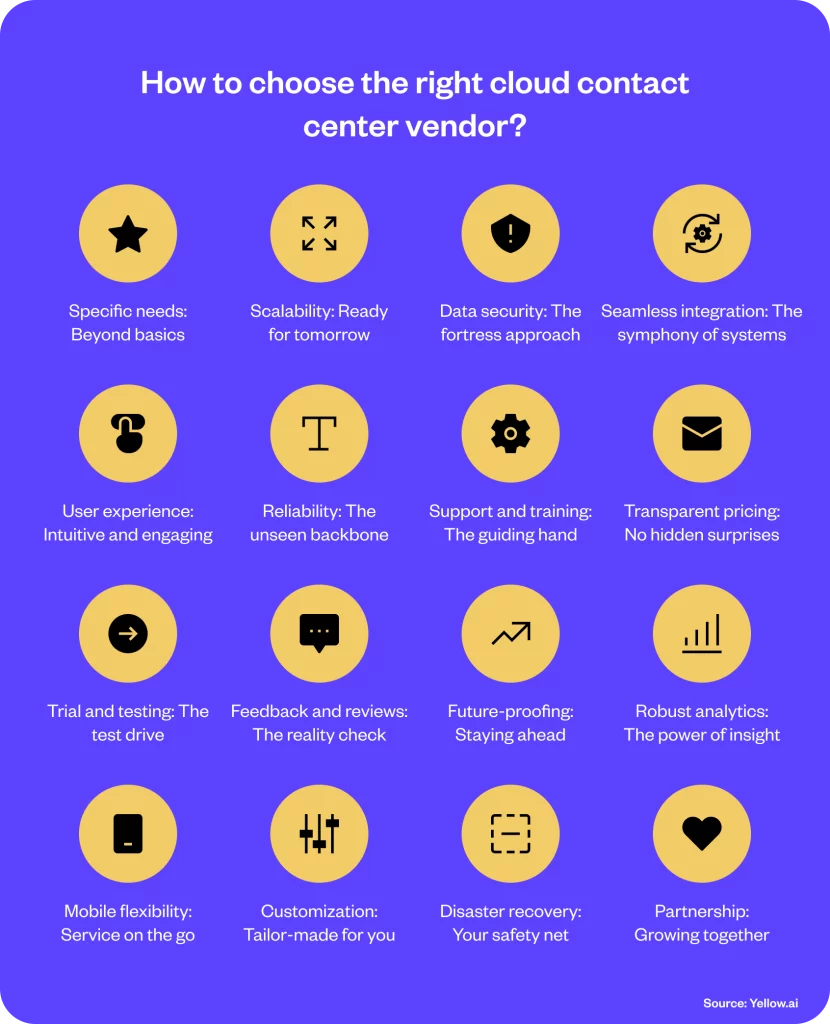Executive summary
Cloud contact centers represent a significant leap in customer communication technology, transcending traditional boundaries to offer a seamless, integrated experience. This article explains what cloud-based contact centers are, how they function, and their comparative advantages over conventional on-premise centers. We will examine their role in enhancing customer experience. The article also aims to guide businesses in selecting the right cloud contact center providers, understanding their benefits, and exploring how cloud contact center solutions are reshaping customer engagement in a digitally driven marketplace.
Picture this: A world where customer support transcends time zones and geographical barriers, where queries are resolved not by location-bound agents but by a global, cloud-powered network. It is the reality ushered in by cloud contact centers, a revolutionary shift from the traditional call center model.
The global market for cloud-based contact centers recently reached an impressive $19 billion, and growth is predicted, with the market expected to reach a valuation of US$ 120 billion by 2032. It is a testament to the changing ways businesses approach customer interactions. Cloud contact centers are not merely an upgrade; they’re a complete overhaul of the customer support paradigm. They harness the power of the cloud to unify communications across phone, email, and social media and seamlessly integrate with existing business applications.

Related must-reads:
- Contact Center Automation: Benefits, Types and Examples
- Omnichannel contact center: benefits, and best practices
- Top 10 contact center automation trends for 2024
- Contact center experience: Types + Ways to improve
Let us understand the technological advancements that make cloud contact centers a game-changer in the realm of customer service.
What is a cloud contact center?
A cloud contact center is a modern iteration of the traditional call center, but with a twist – it’s hosted entirely in the cloud. It means it’s not just confined to a physical location; it’s an omnipresent solution for customer support. Businesses can handle inbound and outbound communications seamlessly, no matter where they or their customers are located.
This model extends beyond just answering calls. It’s an integrated hub harmonizing all forms of customer interactions, whether through voice calls, emails, social media, or chat. Imagine a system bringing together every customer touchpoint into one unified platform. That’s the power of a cloud contact center.
At its core, a cloud contact center offers functionalities like Interactive Voice Response (IVR), call recording, and detailed analytics. But its true strength lies in its flexibility and scalability. It adapts to the changing needs of a business, scaling up or down as required. This adaptability is crucial in today’s dynamic market, where customer preferences and behaviors change rapidly.
How does a cloud contact center work?
The essence of a Cloud Contact Center lies in its ability to handle a diverse range of customer interactions – from inbound and outbound calls to live chats, social media engagements, and even video communications – all through an internet connection. Unlike traditional on-premises systems that rely on physical telecom hardware, Cloud Contact Centers utilize Voice over Internet Protocol (VoIP) technology to facilitate communications.
One of the key strengths of a cloud contact center is its integration capability. It seamlessly connects with various platforms, such as social media, email, and CRM systems. This integration not only brings all customer communication channels under one roof but also ensures that every interaction is linked to the correct customer account, thereby streamlining the process and preventing any overlap or conflict.
The operational model of a cloud contact center is simple yet profound. Since it functions entirely over the Internet, the basic requirements for a team to operate include workstations, headsets, and a stable Internet connection. What makes it stand out is its compatibility with existing hardware – businesses can utilize their current computers and mobile devices without the need for specialized equipment.
Moreover, a cloud contact center’s integration with CRM software plays a pivotal role. It ensures that all communication data is synchronized across the organization, maintaining a single source of truth for customer interactions. This unified approach enhances the customer experience and boosts the efficiency of internal operations.
Benefits of cloud contact centers vs. traditional on-premise contact centers
Businesses are increasingly weighing the benefits of cloud contact centers against traditional on-premise models. Let’s understand the distinct advantages of cloud contact centers, illustrating why they are becoming the preferred choice for modern businesses.
| Feature | Traditional Contact Center | Cloud Contact Center |
| Infrastructure | On-premises hardware and servers | Internet-based, provider-hosted |
| Scalability | Limited by physical infrastructure | Easily scalable with business needs |
| Cost | Higher upfront for equipment and space | Subscription-based, pay-as-you-go |
| Maintenance | Managed by in-house IT staff | Handled by the service provider |
| Flexibility | Fixed location, less support for remote work | Accessible anywhere, supports remote work |
| Deployment | Time-intensive setup and updates | Quick to deploy and easy to update |
| Integration | Can be complex and limited | Seamless with CRM and other apps |
| Disaster Recovery | Requires manual setup | Often built-in with cloud services |
| Security | Managed internally | Provided by the vendor, often more robust |
| Innovation | Dependent on manual upgrades | Continuous and automatic updates |
| Data Access | Localized access | Accessible from anywhere securely |
Benefits #1 – Scalability and flexibility
Cloud contact centers offer unparalleled scalability. They can rapidly adjust to fluctuating call volumes and customer demands without the need for physical infrastructure expansion. This flexibility is a stark contrast to on-premise contact centers, where scaling up often requires significant hardware investment and time-consuming setup.
Benefits #2 – Cost-efficiency
Operating on a cloud-based model significantly reduces upfront costs. There’s no need for heavy investment in on-site hardware, server infrastructure, or software licenses. Businesses pay for what they use, typically under a subscription model, offering a more predictable and manageable cost structure.
Benefits #3 – Ease of access and remote work support
Cloud platforms enable agents and supervisors to access the system remotely, providing flexibility in workforce management and broadening talent pools. This feature is particularly beneficial in today’s remote work environment, whereas traditional contact centers are limited to on-site operations.
Benefits #4 – Rapid deployment and updates
Deploying a cloud contact center is typically faster and less complex than setting up an on-premise system. The service provider can quickly and remotely add updates and new features, ensuring the system stays up to date with the latest technologies and customer service trends.
Benefits #5 – Maintenance and upgrades
In a cloud environment, the service provider handles all maintenance and upgrades, relieving the internal IT team of these responsibilities. On-premise solutions require a dedicated in-house team for ongoing maintenance, which can be resource-intensive.
Benefits #6 – Integration capabilities
Cloud contact centers support seamless integration with various CRM systems, analytics tools, and other applications, enhancing the overall efficiency of customer service operations. On-premise systems may require additional custom development for integration, which can be costly and time-consuming.
Benefits #7 – Disaster recovery and security
Cloud solutions typically include built-in redundancy and disaster recovery capabilities. Service providers also offer robust security measures and compliance certifications, which can be more challenging for organizations to manage with an on-premise setup.
Benefits #8 – Global reach and cultural sensitivity
Cloud-based systems can provide a more culturally sensitive global reach and enable consistent service delivery across regions, which is crucial for businesses operating in multiple countries.
How cloud-based contact centers improve customer experience?
Customer experience is the cornerstone of business success in today’s competitive market. Cloud-based contact centers are at the forefront of this revolution, enhancing customer interactions in multiple ways.

Let’s explore how they drive this transformation:
1. Scales with demand dynamically
One of the most significant advantages of cloud-based contact centers is their scalability. They effortlessly handle fluctuating customer service demands, particularly during peak seasons or special promotions. Businesses can scale their operations up or down without incurring additional hardware or infrastructure costs. This flexibility ensures that customer service remains uninterrupted and responsive, even during high-demand periods, leading to a consistent and satisfying customer experience.
2. Tracks and analyzes conversations in real-time
Cloud contact centers offer the invaluable capability of real-time monitoring and analysis of customer interactions. This feature enables businesses to identify trends, understand customer behavior, and gain insights into preferences and needs. Armed with this data, businesses can make informed decisions to tailor their customer service strategies, resulting in enhanced customer satisfaction and loyalty.
3. Enhances agent productivity and happiness
The flexibility of cloud contact centers directly contributes to agent productivity. Agents have access to all necessary tools and information, reducing training time and increasing efficiency. Moreover, the ability to work remotely leads to higher job satisfaction and lower turnover rates. Happy agents typically provide better customer service, which in turn leads to increased customer satisfaction.
4. Drives customer loyalty through personalization
A key feature of cloud contact centers is the centralization of customer data, including past interactions and support history. This information enables businesses to offer a more personalized customer service experience. Agents can provide tailored responses based on a customer’s history, leading to a feeling of being valued and understood, which is pivotal in building customer loyalty.
5. Drives agility and accuracy through automation
Cloud contact centers automate routine customer service processes, freeing agents to handle more complex inquiries. This automation not only increases efficiency and accuracy but also enhances the customer experience by providing quick and precise responses to common queries.
6. Generates granular performance reports
Cloud contact centers come equipped with robust reporting and analytics capabilities. Businesses can track and measure key performance indicators (KPIs) such as response time, resolution rate, and customer satisfaction scores. These insights are crucial for identifying areas of improvement and for making strategic decisions to optimize customer service operations.
How to choose the right cloud contact center platform?
Selecting the right cloud contact center vendor is pivotal for businesses aiming to optimize customer interactions in today’s digitally connected world. Here’s a simple guide with essential insights to help you make an informed choice:

1. Specific needs: Beyond basics
Begin by charting out your needs, and don’t just skim the surface. Are you looking for AI-powered speech analytics to decipher customer sentiment? Or do you need robust omnichannel capabilities that integrate voice, email, social media, and live chat seamlessly? Your choice should reflect the specific trajectory of your customer service vision.
2. Scalability: Ready for tomorrow
In a world where business dynamics shift overnight, scalability is your lifeline. Your ideal vendor should effortlessly scale operations – think cloud elasticity that can handle Black Friday sale surges or quiet Tuesday afternoons with equal ease.
3. Data security: The fortress approach
With data breaches becoming the norm, your vendor should fortify your customer data like a digital fortress. Delve into their security protocols. Are they compliant with GDPR or HIPAA? Remember, a breach is not just a technical glitch; it’s a dent in customer trust.
4. Seamless integration: The symphony of systems
Your cloud contact center should be the maestro, orchestrating a symphony between your existing tech systems. Whether it’s CRM or ERP systems, the integration should be smooth, avoiding any discordant notes in customer experience.
5. User experience: Intuitive and engaging
The interface should speak your agents’ language. An intuitive, clean dashboard can dramatically reduce training time and boost agent productivity. Imagine a platform that agents look forward to logging into – that’s what you aim for.
6. Reliability: The unseen backbone
Uptime is not just a number; it’s the backbone of your customer service. Investigate the provider’s track record – a single minute of downtime can ripple into a wave of customer dissatisfaction.
7. Support and training: The guiding hand
Good support transcends troubleshooting; it’s about guiding your team through the maze of new technology. From initial onboarding to solving midnight queries, the vendor should be your North Star.
8. Transparent pricing: No hidden surprises
The pricing model should be as clear as a bell. Avoid convoluted pricing structures. You want a partnership with upfront, fair, and predictable costs.
9. Trial and testing: The test drive
A trial period is your test drive. It’s about feeling the wheel, understanding the controls, and foreseeing your journey with the platform. Make the most of it to ensure it aligns with your business highway.
10. Feedback and reviews: The reality check
Scour through reviews and feedback like a detective. These are unfiltered insights into the vendor’s reliability and performance in diverse business landscapes.
11. Future-proofing: Staying ahead
Choose a vendor that’s not just keeping up but setting the pace in technology. From AI advancements to the latest in cloud computing, your vendor should be at the forefront, future-proofing your customer service.
12. Robust analytics: The power of insight
Your platform should be a goldmine of insights. From call resolution times to customer satisfaction scores, these analytics are the compass guiding your customer service strategy.
13. Mobile flexibility: Service on the go
Work is no longer tied to a desk in today’s world. So, ensure your platform supports mobile accessibility. This flexibility allows your team to deliver exceptional customer service anytime, anywhere.
14. Customization: Tailor-made for you
Your business is unique, and so should be your cloud contact center. From custom reports to bespoke workflows, your platform should be a tailor-made suit, fitting your business perfectly.
15. Disaster recovery: Your safety net
Your data needs a safety net in an unpredictable world. Ensure your vendor has solid disaster recovery and data backup protocols. It’s about being prepared for the worst while expecting the best.
16. Partnership: Growing together
Finally, this decision is about fostering a partnership. Your vendor should be a collaborator in your growth story, understanding your evolving needs and supporting you through the journey.
Choosing the right cloud contact center vendor shapes your business’s future customer interactions. Approach it with a blend of technical insight, strategic foresight, and intuition. Remember that this choice is about finding a partner who resonates with your business ethos and propels you toward unparalleled customer service excellence.
As you explore the realm of cloud contact centers, it’s essential to partner with a provider that aligns seamlessly with your business needs. Yellow.ai stands out as a formidable choice in this domain. With its state-of-the-art cloud contact center solutions, Yellow.ai offers a suite of features tailored to modern business demands. From AI-driven analytics and omnichannel support to seamless integration with existing systems, Yellow.ai ensures your customer interactions are efficient, personalized, and secure. The platform’s scalability caters to businesses of all sizes, ensuring you’re equipped for both current demands and future growth. Ready to transform your customer communication landscape?
The final word on contact cloud centers
The transition to cloud contact centers marks a pivotal shift in how businesses interact with their customers. These centers not only offer unparalleled flexibility and scalability but also provide a platform for innovative customer engagement strategies. With cloud technology at the helm, businesses can navigate the challenges of modern customer service, turning every interaction into an opportunity for growth and loyalty. As we continue to witness the evolution of customer communication, cloud contact centers stand as a testament to the power of technology in bridging gaps and creating meaningful connections in the digital age.
Frequently asked questions (FAQs)
What is a cloud contact center?
A cloud contact center is a modern, internet-based facility that manages customer interactions across multiple channels like phone calls, emails, chat, and social media. Unlike traditional centers, it’s hosted on the cloud, offering greater flexibility, scalability, and access to advanced technologies like AI and analytics.
What are the main benefits of cloud contact centers?
Cloud contact centers offer several benefits, including scalability, cost-effectiveness, and flexibility. They allow businesses to quickly adjust to changing customer demands, reduce upfront infrastructure costs, and support remote work. Other advantages include seamless integration with existing systems, enhanced data security, and access to advanced analytics.
What is the difference between a cloud contact center and a hosted contact center?
A cloud contact center is hosted on a cloud platform and is accessible over the internet, offering high scalability and flexibility. In contrast, a hosted contact center is typically located off-premises. Still, it is managed by third-party providers on dedicated servers, which may limit scalability and flexibility compared to cloud-based solutions.
What is the difference between a contact center and a call center?
A contact center handles customer interactions across various channels like phone, email, chat, and social media, offering a holistic approach to customer service. A call center, on the other hand, primarily focuses on managing customer interactions through telephone calls.
Should I choose a cloud contact center over a cloud call center?
Your business needs to determine whether to choose a cloud contact center or a cloud call center. A cloud contact center is more suitable for multi-channel customer support and advanced features like analytics and AI. However, if your primary focus is handling customer calls, a cloud call center might suffice.




















